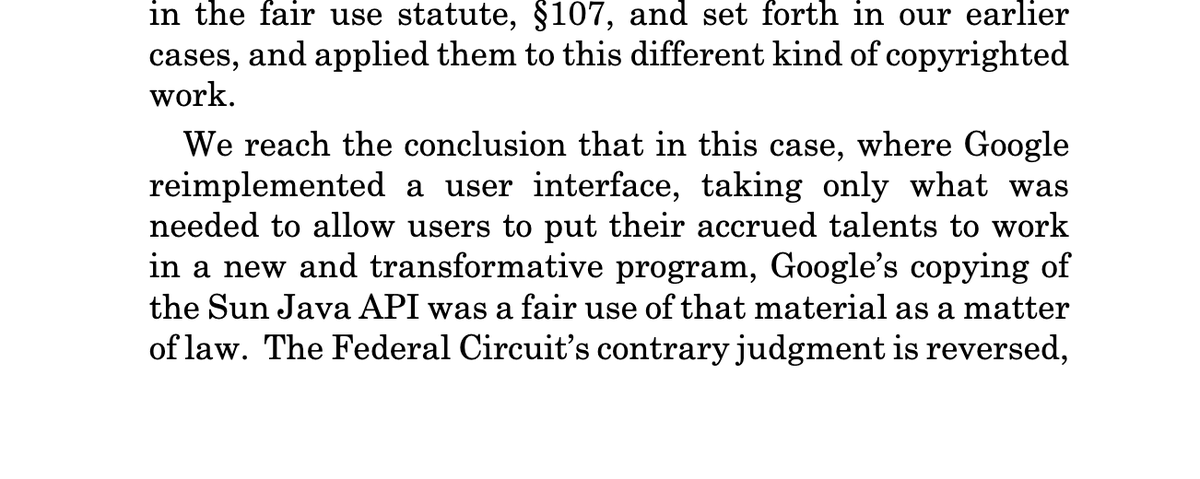
Wow--SCOTUS doesn't just rule in favor of Google in @googlevoracle, but says that API reimplementation is fair use *as a matter of law*, meaning that the decision applies to all APIs 

(Wow I've forgotten how to use twitter, #googlevoracle is not a username)
Anyway, this is great news for software folks. The concern was that SCOTUS could just let the jury decision stand, solving Google's case but leaving an open question for all future software developers. Deciding as a matter of law allays that fear
What it means for fair use more generally is an interesting question; I don't know whether judges or juries are preferable w/r/t fanfiction, artwork, AI, etc. But for software, this is a big step toward settling the question
Oh man, Breyer went to town with the analogies:
Gas pedal of car
QWERTY keyboard
Dewey Decimal system
Robotic chef pulling recipe cards from a file cabinet
Gas pedal of car
QWERTY keyboard
Dewey Decimal system
Robotic chef pulling recipe cards from a file cabinet
On the analysis of the second fair use factor (nature of the copied work), this is an interesting passage: Breyer looks at how the value of the work is external to traditional copyright interests. This could be important for non-software issues like fanfics 

Even more along the lines of fanfics, using the API "to create new products" favors the first factor (purpose and character of the use) 

In discussion of the third factor (substantiality of the amount used), Breyer calls reimplementation to permit programmers to reuse their experience as "legitimate objectives"
This is quite a statement: "public benefits the copying will likely produce" are relevant to fair use under the forth factor (economic impact). That's going to be cited in every fair use case forever, and will really advance the discourse on copyright IMHO 

Still on the fourth factor (economic impact), this is a fantastic statement on how copyright can impede downstream creativity and competition, and how fair use can avoid that anticompetitive consequence 

Thomas, in dissent, reviews copyrightability of APIs, largely following the logic that Congress permitted copyrights in software; APIs are software; therefore APIs are copyrightable. I have a disproof of this, which the character limit is too narrow to contain
Thomas's analysis of the fair use factors is largely bound up in Google's specific effects on Oracle's market. That raises a fascinating question: Should fair use consider the class of use beyond the specific case? If fair use is a matter of law, then I think it has to
Put another way, if courts are ruling on API reimplementation fair use overall, then they have to think about fair use for all reimplementers, not just Google. Breyer's reliance on competition and the public interest does this
That's a big, big statement on fair use, and it's going to resonate well beyond software
So that wraps up my live-tweeting of the opinion. Some conclusions/thoughts:
This case is a big win for API reimplementation. Will it answer all cases? Probably not because fair use is notoriously fact-specific. But the majority really emphasized it was looking at the issue as a whole, which is going to make it hard for courts to go otherwise in new cases
I raised the possibility of legislation on API copyrights after the oral argument. I still think that could happen, given how closely this case is tied to interoperability of Internet platforms, and laws could solve other barriers to competition. But this opinion will help a lot
On fair use more generally, I think that this decision is going to change the dialogue. Fair use cases now often hinge on the user's perceived good or bad faith; this case largely rejects that view in favor of a broader analysis of progress and competition
I do still wonder about making fair use a matter of law rather than a jury issue, but others will have better opinions on that then I will
Here's a fun question: What does this do to patents? I'll bet it ramps up pressure to expand patents on software, which Congress has already been toying with. Any of you software folks who are happy with this copyright decision might want to look to what happens there
FInally, some personal thoughts. It was cases like these that made me, as a computer science undergrad, think that law school might be worthwhile. It was this exact case that made me, as a young patent lawyer, think that there were things in IP law that ought to be changed
I won't say that Oracle v. Google was why I went into policy, but it was certainly an issue that drew me there, and the first SCOTUS cert petition was one of my first amicus briefs. To now see, almost a decade later, my own brief cited in a majority opinion is...really something
Back in my programming days, I would not have thought that the highest court in the land would care much about what I thought. Turns out, at least sometimes, they do
There are software developers out there who have better and stronger ideas of how to make this world better but think that policy is out of their hands. It's not, and I'd encourage you to try making those ideas happen. I'm happy to help
Finally, lots of people worth reading on this issue right now. @PamelaSamuelson @xor @travelingheidi @bergmayer @binarybits @alisternburg @MSchruers among others
Didn't expect this thread to go as far as it did! No SoundCloud here, but I've got an...SSRN page? papers.ssrn.com/sol3/cf_dev/Ab…
• • •
Missing some Tweet in this thread? You can try to
force a refresh



